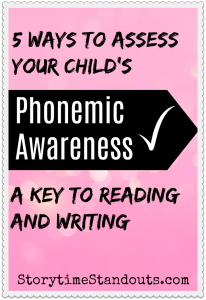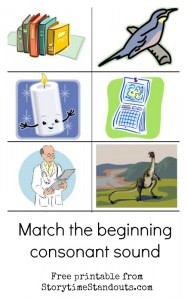5 Ways to Assess Your Child’s Phonemic Awareness (Series)
The focus of our last few posts has been phonemic awareness, an important element of readiness for reading and spelling. Here are 5 easy ways you can assess your child’s phonemic awareness. Be sure to explore our related posts for additional assessment tools and ways to enhance reading and writing readiness
 #1 – Can your child break a word apart by syllable? If you say “carpet” can your child hear and say “car – pet”?
#1 – Can your child break a word apart by syllable? If you say “carpet” can your child hear and say “car – pet”?
#2 – Can your child mush sounds together (to make a word)? If you say “r – a – t” can your child hear and say “rat”?
#3 – Could your child hear whether two words begin with the same sound? smile and sun vs moon and earth
#4 – When asked to listen for a sound, can your child distinguish whether the sound is at the beginning, middle or end of a word? For example, when asked to listen for the /S/ sound, can your child hear it at the beginning of “skunk”, in the middle of “listen” and at the end of “tents”?
#5 – Could your child tell you the sound at the beginning of a word? Could he say which sound is at the end of a word? And, most difficult of all, could your child correctly identify the sound in the middle of a word?
It is not difficult to understand why a child with above average phonemic awareness will probably be a very good speller. If he or she can hear the sounds in words, he or she is more likely to spell the words correctly. Likewise, a child with above average phonemic awareness will probably be a very good reader.
Here are some free printables that you can use to help your child notice the sounds in words
It is worthwhile to note that these printables can be used before a child is reading or writing or after he/she is a beginning reader.

 Match the Ending Consonant Sound
Match the Ending Consonant Sound
Another way to help children develop phonemic awareness. Matching the ending consonant sound is more difficult than matching the beginning consonant sound.
 Match the Beginning Consonant Sound
Match the Beginning Consonant Sound
Cut the pictures apart and have children match the initial consonant sound - a great way to support the development of phonemic awareness.
For more ways to help your child develop phonemic awareness, follow this link to visit our Phonemic Awareness page.







































